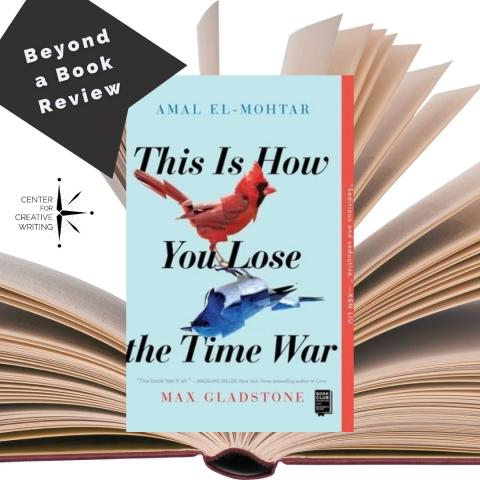
In this series, Shawna Ayoub moves "beyond a book review" in not only recommending great books by diverse writers but highlighting a technique to apply to your own writing practice.
This is How You Lose the Time War by Amal el-Mohtar and Max Gladstone
When you’re ready to risk the perils of time travel during a space-time war (today, perhaps?), pick up This is How You Lose the Time War.
This novella is a series of secret missives between rival time war agents Red and Blue. They travel up and down the strands of time, sowing the seeds of destruction against each other’s factions. One leaves a letter for the other. So begins a correspondence lasting centuries, and which blossoms into one of the most lyrical queer love stories of all time.
This book is a study in writing. First, there is the more obvious look at epistolary form. Red and Blue have distinct voices. Their letters open with more concrete storytelling, offering specifics of time and place, but gradually slip into more intimate language as the nature of the writers’ relationship changes. The prose moves from descriptive to overly descriptive, becomes saturated, heavy with metaphor. Red and Blue intertwine, and the prose becomes purple, a shift by el-Mohtar and Gladstone that is no doubt intentional.
Purple prose
Not following? I’ve got you. Purple prose is “characterized by the excessive use of adjectives, adverbs, and metaphors." While it is often criticized in writing, in This is How You Use the Time War, the richness of the prose elevates the emotional exchange and depth of the developing relationship between Red and Blue. It becomes the relationship itself, alive, on the page. The reader is then sipping the infusion of their love, so to speak, by reading.
My wife read this book two or three years ago. She then bought a copy, put me in the bath, and started reading it to me. Life got in the way of us finishing it, so when it popped up on Libby as available to borrow just before a long drive, I checked it out and buckled in. I love an audiobook, and I love the performance of this novella. It was beautifully done. My heart lifted as the love between Red and Blue developed. I was rooting for them and almost had to pull over and call my wife to ask her what was going to happen. I wasn’t sure if I could see the story through if they didn’t find their way to each other. But I kept my wits.
Shout out to Amal el-Mohtar, whom I hope to one day meet. She’s a Canadian writer of queer fantasy and speculative literature, and she wrote the voice of Blue in this novella. On her Goodreads page, she provides her discussion with Gladstone about how they split up the work of writing the book, and it makes for an interesting and instructive read. El-Mohtar and Gladstone touch on themes of consciousness and surveillance, which are big in the book, but which they didn’t necessarily connect with as they were writing. I love that anecdote of discovery in process; it’s always interesting to see what comes forward in our work. Shout out to Max Gladstone, too, because his writing is equally gorgeous.
I think this is the first book I’ve reviewed by two authors that isn’t an anthology, which is interesting because I’ve been deep in co-authored books lately. This one stands far above the rest. It has won the 2019 Nebula Award for Best Novella, the 2020 Hugo Award for Best Novella, the 2020 Aurora Award for Best Short Fiction, and the 2020 Ignyte Award for Best Novella, after all. Which is to say, writers, maybe take up correspondence with a friend? I’ll help you get started.
A writing exercise
For 20 minutes, compose a letter as if you are at the end of something. Perhaps you have completed your research mission on a far-off planet. Maybe you said goodbye to a pet. It could be that you are volunteering your living brain to science and it will kill you. As a bonus, make your prose purple. And don’t forget to invite your addressee into ongoing correspondence for as long as you have left!
Have you ever tried epistolary writing before? How about purple prose? Will you try this exercise? Read this book? Let us know how it goes in the comments.
If this month’s title sounds intriguing to you, consider purchasing your own copy of This is How to Lose the Time War from Bookshop.org in support of independent bookstores across the U.S.
Read this post on the Center's Substack and subscribe, if you haven't already, to receive posts like this in your inbox every Wednesday.
